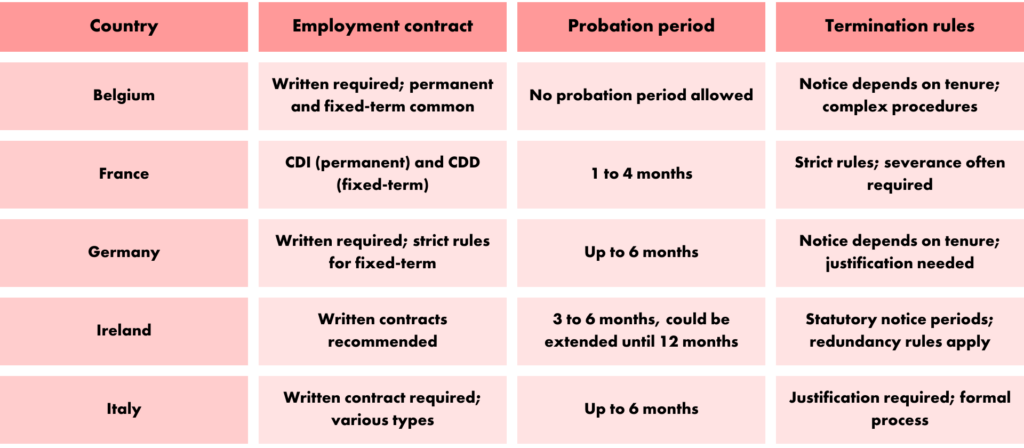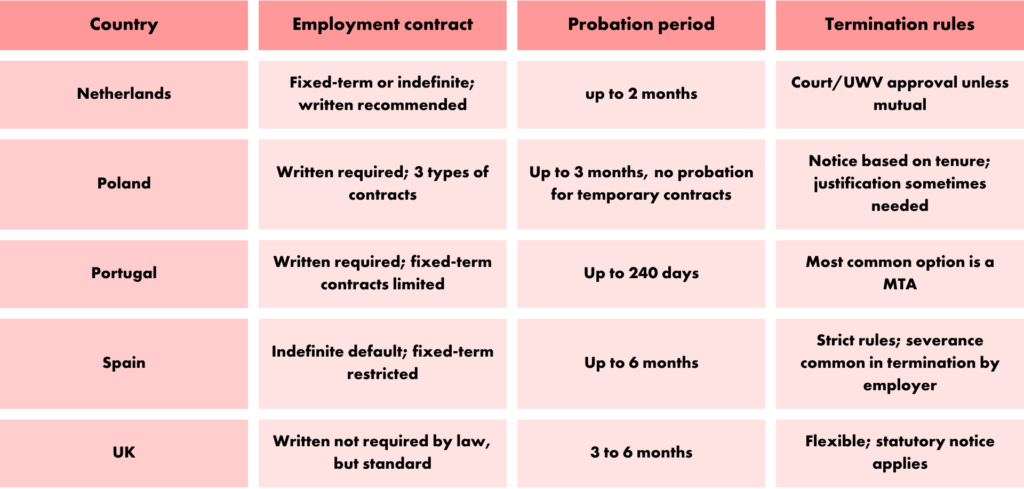Understanding HR compliance in Europe
Expanding your business into Europe opens the door to exciting opportunities but it also comes with a set of HR regulations. While the European Union provides a level of harmonization through directives like GDPR and the working time directive, the reality is that each country still maintains its own distinct employment laws, payroll systems, and compliance requirements.
For businesses hiring employees in multiple European countries, navigating this patchwork of national regulations can be a challenge. From differing rules on employment contracts and working hours to country-specific obligations around leave entitlements, tax contributions, and terminations staying compliant across borders requires more than just good intentions.
Non-compliance can lead to serious consequences, including fines, reputational damage, and even legal disputes. That’s why local HR expertise isn’t just helpful, it’s essential. Understanding the nuances of each country’s legal framework ensures you can hire and manage employees with confidence, while focusing on your core business.
Understanding the European legal landscape
When it comes to HR regulations in Europe, it’s important to distinguish between EU-wide directives and national employment laws. While the European Union sets the stage with overarching legal frameworks, each member state retains the authority to interpret and implement these laws in ways that reflect their local labour market and cultural norms.
Several key EU directives form the foundation of employment law across the region. These include:
- GDPR (General Data Protection Regulation): A critical regulation for employers handling employee data. It sets strict rules on how personal data should be collected, processed, and stored, ensuring transparency and protection of employee privacy.
- Working time directive: Establishes minimum standards for working hours, rest periods, and paid annual leave. It limits the average working week to 40 hours, but how this is implemented (and whether opt-out clauses apply) varies by country.
- Posted workers directive: Protects the rights of employees sent by their employer to work temporarily in another EU country. It ensures that posted workers are entitled to key employment conditions of the host country, including pay, working hours, and health and safety.
Country-specific employment laws


Leave entitlements in Europe
Leave entitlements are a key component of employment law across Europe, but the specific rules and expectations can vary significantly from one country to another. While EU legislation sets a minimum standard of four weeks of paid annual leave, many countries exceed this, either through national law or collective agreements. However, this can vary depending on national systems. For example, in Belgium, the number of paid leave days depends on how much you worked in the previous year. If you worked a full year at 38 hours per week, you’re entitled to 20 days, but if you worked less, your entitlement will be lower. This means that what counts as a generous leave policy in one country may simply be the legal minimum in another.
In addition to paid vacation, European countries generally offer robust protections when it comes to family-related leave and sick leave. Maternity leave typically ranges from several months up to a year, with varying levels of pay depending on the national system. Paternity and parental leave entitlements have expanded across the region in recent years, reflecting growing support for shared caregiving responsibilities. Sick leave is also well-regulated, with most countries requiring employers to cover the initial period of absence before national health systems step in. For example, in the UK, employees are entitled to 5 days of sick leave, while in Ireland, the entitlement is 7 days.
Public holidays further add to the complexity, as both the number and timing of these days differ widely across Europe. Some countries observe more than ten public holidays each year, while others have fewer, and in many cases, additional regional holidays apply. These holidays can affect payroll, especially when employees are required to work on those days, which often triggers mandatory overtime pay or compensatory leave.
Working hours and overtime
Across Europe, what counts as full-time work can vary slightly by country, but generally falls within the range of 35 to 40 hours per week. While some countries, like France, have set a shorter standard working week of 35 hours, others such as Italy, Germany, or the Netherlands typically define full-time work closer to 38 or 40 hours.
Overtime regulations also differ from country to country. In most cases, employees who work beyond their standard hours are entitled to additional compensation, often at an increased rate. However, the specific overtime premiums and the rules governing maximum working hours depend on national legislation and, in many cases, collective labour agreements. For instance, some countries impose strict limits on the number of overtime hours allowed, while others leave the terms to be defined within the employment contract or sector agreement.
Employers must ensure that working time, including any overtime, stays within the limits set by the EU Working Time Directive, which caps the average working week at 48 hours. Understanding the local rules around working hours and overtime is crucial not only for compliance but also for maintaining a fair and sustainable working environment.
Employee benefits and perks
In Europe, employee benefits typically fall into two categories: statutory benefits required by law and optional perks offered by employers to stay competitive. Statutory benefits usually include social security contributions, health coverage, and pension schemes, but the specifics vary by country.
Beyond the legal minimum, many companies offer additional perks to attract and retain talent. Popular benefits include meal vouchers, company cars, private health insurance, and the so-called 13th month salary, an extra month of pay often given at the end of the year. These extras are not mandatory but are widely expected in some countries and industries, making them an important part of the overall compensation package.
Data protection and employee privacy (GDPR)
Under the GDPR, employers must handle employee data with care, ensuring it’s collected, stored, and processed lawfully. This includes limiting data to what’s necessary, securing it properly, and being transparent about its use. Employees have the right to access their data, request corrections, and understand how it’s being used. In many cases, companies must also establish clear data processing agreements with third parties handling personal information on their behalf.
Partnering with Parakar for HR success in Europe
Navigating HR compliance across Europe can be complex but you don’t have to do it alone. Parakar provides hands-on support with local HR regulations, payroll, and employment requirements in multiple European countries. With our in-country experts and tailored solutions, we help companies stay compliant and focus on growing their teams with confidence. Ready to simplify your HR operations in Europe? Contact us today to learn how Parakar can support your international growth.
Get in touch


